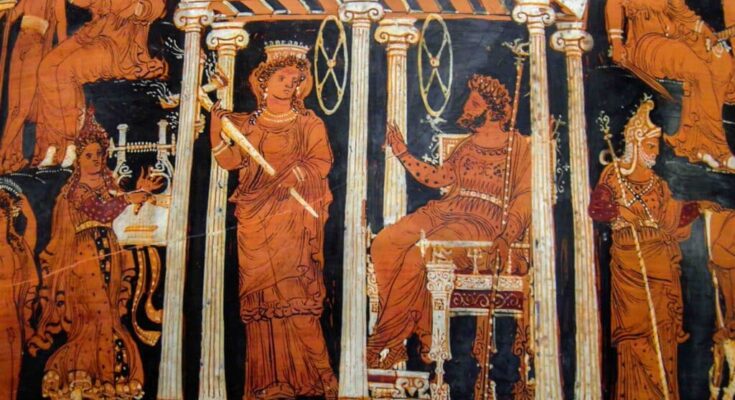
Plouton isn’t just your average ancient god. He’s the mafia boss of the Olympian pantheon. He ruled the underbelly of the ancient world with a grip as tight as the gold buried beneath the earth.
As the lord of the Underworld and god of wealth, Plouton’s influence stretches from the afterlife’s darkest corners to the earth’s hidden treasures. His dual role balanced power, wealth, and the inevitable end that even gods can’t escape, exemplifying that life and death are two sides of the same coin.
God of the Underworld
Plouton, or Pluto in Roman mythology, had a diverse job description. To begin with, he was the god who ruled over the Underworld, a place where the dead went after their time on earth.
The ancient Greeks painted the Underworld as a shadowy place where souls lingered after death—not quite heaven but not hell either. Plouton wasn’t evil, though. He was more like a strict manager ensuring that every soul found its place.
This wasn’t just any Underworld, either. It was a realm filled with various areas for different souls. Plouton had to keep everything in order, making sure the virtuous ended up in Elysium, the morally neutral in the Asphodel Meadows, and the wicked in Tartarus.
He kept the peace in a place where no one wanted to be. It wasn’t all gloom, however, because Plouton’s Underworld was also the source of all earthly riches.
Looking for a god in finance
Aside from being the lord of death, Plouton was in charge of cash. Plouton’s name literally means wealth. The connection between Plouton and wealth came from the idea that all riches, whether crops or gold, came from beneath the earth.
Hence, while Plouton was busy managing the dead, he also kept an eye on the ancient stock-market, the treasures hidden underground.
This made him a god who was both feared and revered. Farmers prayed to him for good harvests and miners for rich veins of ore. He wasn’t just about the doom and gloom of death. He was also the bringer of abundance.
The cornucopia, often shown in his hand, symbolizes this dual role. It is a reminder that he held the power of life and death even over the very food that sustains humanity.
What did Plouton symbolize?

Plouton’s symbols tell you a lot about his character. He’s usually shown as a solemn, bearded figure holding a scepter, a sign of his authority over the dead. This isn’t a guy who takes his job lightly.
The cornucopia, overflowing with fruits and grains, is another key symbol, linking him directly to the idea of wealth and abundance. These symbols aren’t just for show. They represent the balance he maintained between life and death.
Another symbol often associated with Plouton is the bident, a two-pronged fork that sets him apart from his brother Poseidon, who wields a trident. While Poseidon rules the seas, Plouton rules the earth’s depths.
And let’s not forget Cerberus, the multi-headed dog who guards the Underworld gates. Cerberus’s presence underscores Plouton’s power; no one gets in or out without his say-so.
These symbols together make Plouton a figure who’s both respected and feared, someone who controls not just death but also the hidden riches of the earth. If his symbols didn’t inspire respect, his stories would’ve certainly done so.
Mythical role

Plouton might not have had as many intrepid stories as some other gods, but he played a crucial role in some of the most important myths. Take the story of Persephone, for example.
Plouton fell in love with Persephone and abducted her to the Underworld. This act sent her mother, Demeter, into a deep depression, causing the earth to become barren.
The ancient Greeks used this myth to explain the changing seasons. Persephone’s return to the earth marked the start of spring, bringing life and renewal.
This story shows how intertwined Plouton was with the natural world. He wasn’t just a god of death; he was a god of life’s cycles.
Without him, the seasons wouldn’t change, and the earth wouldn’t yield its crops. He was a reminder that death and life are part of the same continuum, each giving rise to the other.
Plouton’s realm
Plouton’s Underworld was a complex place with different areas for different kinds of souls. The virtuous went to Elysium, a paradise where they could enjoy eternal peace.
The morally neutral souls ended up in the Asphodel Meadows, a place of shadowy existence, neither pleasant nor painful.
The wicked were sent to Tartarus, a hellish pit of torment. Plouton made sure that every soul ended up where it belonged, maintaining the balance of the afterlife.
This wasn’t just a grim job. It was an essential one. Without Plouton, the Underworld would descend into chaos, and the natural order of life and death would be disrupted.
His realm was a reflection of the ancient belief that death wasn’t the end but a continuation of the soul’s journey. This belief in an ordered afterlife helped the ancient Greeks make sense of the world around them.
Plouton: god of gold and graves
Plouton’s dual reign over fortune and death is an ancient reminder that the riches sought after are a few shovels away from the earth that will eventually claim all. His attributes inspire a type of memento mori, a reflection on mortality that urges a reconsideration of the relentless pursuit of wealth.
Plouton’s influence highlights the futility of material wealth and underscores the ultimate truth: death is the great equalizer, coming for the rich and poor alike.



